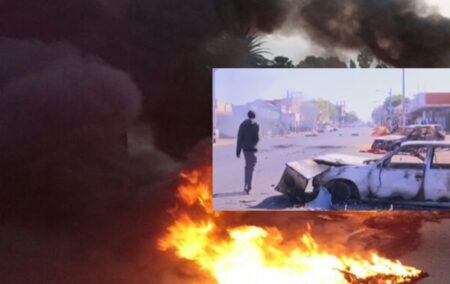We would like to be convinced otherwise, but the evidence suggests the government has in effect lost control and can at best manage and mitigate the anarchy that besets the country.
A monopoly on the use of violence is one of the definitions of a state. Citizens cede that monopoly to the state and, in exchange, the state keeps them safe from the threat of anarchy. It is increasingly a definition against which South Africa does not qualify.
The anti-immigrant riots and pogroms of this past week are a reminder that the truck attacks that have repeatedly paralysed our country’s highways, the hijacking of construction sites, the assaults against Uber drivers, the burning of trains in Cape Town, and the murderous campaigns against our country’s farmers are not once-off outlier events, tangential to our country’s trajectory, but very much in line with, if not definitive of, that trajectory.
The pure hard numbers on murder, the global benchmark of safety, would suggest that South Africa is becoming a safer and hence more stable society. In 1994, 67 out of every 100 000 people in our country were murdered. That number had fallen to reach 36 per 100 000 last year. By comparison, however, the rate for Australia is 0.8/100 000. In Britain, it is 1.2/100 000. As a rule stable democracies average rates of below 2-3/100 000. The United States is an outlier at 5.3/100 000.
But against that trend there are two others that question whether the State still retains a monopoly on the use of force and violence in society. My colleagues are in possession of data showing that the per capita incidence of violent protest action in our country is up by over 100% in a decade to average just shy of ten incidents per day.
In 1997, South Africa had 110 177 police officers – boots-on-the-ground officers doing police work, not civilian or admin staff – and 115 331 private security officers. Now, the numbers are 150 791 and 522 542 respectively. Private security now outnumbers the police and the military combined by 252%, and is additionally significant in the out-skilling and professionalising of security personnel who work for the State.
All three sets of data must further be read against the capability of the State to curb the pogroms, the construction-site hijackings, farm attacks, and the train and truck burnings. The intelligence services seem unable to anticipate attacks and identify ring leaders. Police action revolves around running battles and mass arrests of individual rioters. This has been going on for a decade. We still do not have a straight answer on how many murder convictions were obtained following the 2008 xenophobic riots when 60 people were murdered. Under correction, we think the number is zero. Most pathetic is the Tweets sent out by government agencies and politicians either imploring citizens to please not murder and rob each other, or threatening ‘zero-tolerance’ – even as the violence spreads. In Cape Town, more than half of Metrorail’s trains were reported to have been lost to arson in 2018.
Is there enough evidence now to suggest that the government has in effect lost control and can at best manage and mitigate the anarchy – but is powerless to stop it? We would like to be convinced otherwise, but I don’t think that is possible. And, if that is right, then a very important point of no return has been reached by our society. It is not a point of cataclysm or collapse but rather one of realising that your physical safety and that of your property and interests in South Africa is something the State cannot, and will not again, be able to ensure. The upshot of which is that if you want a relatively safe future, you need to make your own arrangements on an individual as well as a community basis.
Many have already done so but will have to go further than merely safeguarding homes and vehicles and businesses, given the extent of lawlessness and anarchy. ABSA, I am told, this week instructed staff to work from home and not run the gauntlet to the bank’s offices in the Johannesburg city centre. In time, a point may be reached where that bank has to patrol and safeguard all the main routes into its offices. The Nigerian government has alluded to taking steps to protect its citizens in South Africa. One Zimbabwean chap I encountered spoke of organising ex-Zimbabwe military personnel to protect community members against attacks by South Africans – a desperate notion but one born of real fear (he had been saved from a prior assault by private security officers).
On all matters – from schools, to hospitals, businesses and livelihoods – this is probably going to be the dividing line between those groups who do relatively well in a future South Africa and those who do not; the ability to understand early on that if you are going to make it, you will do so through your own wits and imagination, while those who wait for the State to deliver are going to be left perpetually disappointed.
Also this week, the government hosted the World Economic Forum in Cape Town in order to re-state its case that South Africa was on the right track and open for business. The context could not have been more at odds with those assurances and I have little doubt about which of the two views did more to capture the imagination of those the government had invited here to show how the new dawn is going.
Frans Cronje is the CEO of the IRR.
If you like what you have just read, become a Friend of the IRR if you aren’t already one by SMSing your name to 32823 or clicking here. Each SMS costs R1.’ Terms & Conditions Apply.

